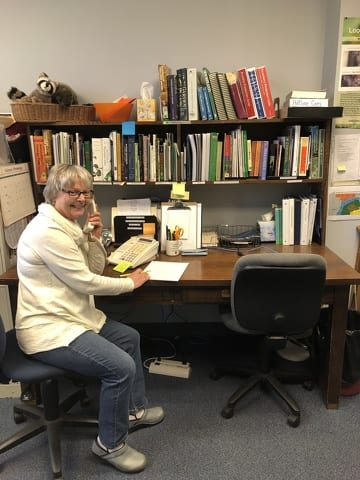There are times when “patient labor and attention” are not enough. Sometimes, practical research-based knowledge is necessary to solve a gardening problem or answer a question. That’s where the Penn State Extension Master Gardener Garden Hotline can help.
Started in 2009 as an invaluable arm of the extension, the hotline offers free specific feedback for a myriad of pest, disease or general questions home gardeners may have about any of the following: house plants, native plants, insects, turf, annuals, perennials, fruit/fruit trees, vegetables, herbs, trees and shrubs.
The hotline is located in a modest office in the Willowbank Building on Holmes Street in Bellefonte, and it is overseen by master gardener coordinator Molly Sturniolo and hotline administrator Faith Gleim. Members of the hotline staff are available to serve the public on Monday and Wednesday mornings from 9 a.m. to noon from May through September. The hotline can be reached directly by phoning (814) 355-4897 or emailing centremg@ag.psu.edu.
How does the process work? Suppose you email the office after noticing something strange about your tomato plants, such as brown patches with bull’s-eye patterns on lower leaves.
The hotline staffer may first respond to the email by asking for clarification.
The more information available, such as the variety of tomato, when the problem was noticed, whether it’s occurred before, whether the tomato plant has been treated by an insecticide or fungicide, where the plant was purchased, how the site is being watered and fertilized, etc., will help in analyzing the problem. Attached pictures also can provide valuable clues to a diagnosis.
Once the hotline staff has collected information, it will work to arrive at an answer based upon multiple sources from online research, as well as on-site books and publications. This can take some time, up to several days in some cases, but most questions are dealt with quickly.
If the conclusion is that it could very well be early tomato blight, the hotline volunteer will then reply to the home gardener in an email. The volunteer will directly address the question and may, for example, offer links to help confirm the identity of the pathogen, as well as information on its cycle and management of the disease and ways to prevent it in the future. He or she may also recommend a general Penn State-published growing guide for tomatoes. Each question will get a tailored response.
If the homeowner phones the hotline office, much of the same process will be followed, except that the information will be collected over the phone. Specimens also can be brought directly to the office for inspection, when practical. If the person does not have computer access, a reply along with pertinent publications will be mailed.
What occurs if the hotline staff is unable to offer a definitive diagnosis? In that instance, a specimen may need to be sent to the Plant Disease Clinic located in the Buckhout Lab on campus to be examined by the plant pathology group, with the results sent to the homeowner.
Last year, the Center County Master Gardener Garden Hotline provided answers to 165 home gardening questions on topics as varied as animal control, climate, organic gardening, weed control, plant ID, composting, soil testing, turf grass and more.
The hotline’s master gardeners also staff a question-and-answer table at various gardening events around Centre County, such as the plant sales and Grange Fair and, equally important, they alert home gardeners to be on the lookout for pests that will potentially do widespread damage.
Most recently, it is the spotted lanternfly that is the subject of a national pest alert.
This distinctive invasive sap-feeding planthopper, believed to have originated in China and first discovered in Berks County in 2014, can feed on numerous host plant species and appears to be spreading quickly across the state. It poses a very serious economic threat to many U.S. industries that include the cultivation of grapes, fruit trees, ornamentals and timber.
Because early detection is important to its control, homeowners are being asked to collect insect or egg cases they may spot on their property and report it to the Pennsylvania Department of Agriculture by emailing badbug@pa.gov. Photographs of its various lifecycle stages, as well as complete information about its management and quarantine in Pennsylvania, can be found at ncipmc.org/action/alerts/spotted_lanternfly.php.
Another service master gardeners will soon be performing is providing expert advice, along with the sale of more than 5,000 plants, including vegetables, herbs, native species, pollinators, and unusual annuals, at its ever-popular Penn State Extension Master Gardeners of Centre County Plant Sale. This annual fundraising event will be held at the Penn State Ag Progress Days venue, 9 miles southwest of State College on state Route 45 from 9 a.m. to 3 p.m. Saturday, May 19. There is ample parking at the facility and it is free. Come early for the best selection of plants.
Some new additions this year feature “learning tables” for topics ranging from growing loofahs, planting bulbs and using grow boxes to caring for bonsai plants and propagating house plants. For the first time, there also will be gardening activities for children.
The popular silent auction, garage sale, snack bar and vendors will, of course, be back.
The knowledgeable hotline group, as well as all the master gardener volunteers, offer valuable educational programs and practical hands-on advice when you need it most — this spring in the garden.



